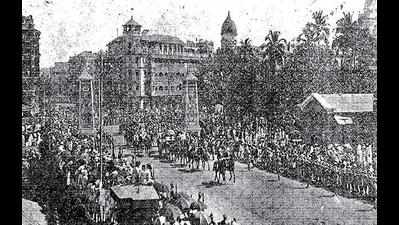Mumbai: A century ago, an unwelcome royal guest left a trail of riots in Bombay

Gandhi called for boyctt of royal procession, but thousands turned up
India was still sore from the scars of 1919's Jallianwala Bagh massacre and Bombay was in the grip of Mahatma Gandhi's non-cooperation movement when this quickly-forgotten four-day-long violent chapter of Mumbai's history called 'The Prince of Wales Riots' unfolded. In anticipation of the future emperor's arrival, the then Viceroy, Lord Reading, had planned a grand welcoming ceremony and 80,000 copper medals were specially minted with the words: "Visit of His Royal Highness. Bombay. November 1921". Gandhi, on his part, announced a hartal on the day of the Prince's visit saying: "If a robber held a feast at our expense, would we attend it?"
"After Gandhi set alight his bonfire of foreign-made cloth at 10.30 am, striking mill workers stormed out of the Elphinstone Mills compound and burned a few trams and automobiles," wrote historian Dinyar Patel in his 2008 research paper on the communal riots in which Hindu and Muslim supporters of Mahatma Gandhi--angered by violations of the hartal-- attacked Parsis and members of "other supposedly loyalist minorities".
Besides robed maharajahs and sober-suited soldiers, attendees included Mumbaikars chiefly from the Parsi, Anglo-Indian, and Jewish communities. “Despite the thousands of placards displayed in every nook and corner of the city appealing in the name of Mr Gandhi for a boycott of the Prince's visit, people began to flock towards their chosen points of vantage along the route fixed for the Royal procession from Apollo Bunder to Government House..." said a TOI report. After the ceremony, crowds saw men wearing Gandhi caps or the Khilafat fez on the streets throwing stones at vehicles passing by Marine Lines and Charni Road. Soon after the prince left for Malabar Hill's Government House, crowds at Kalbadevi began throwing stones at trams and at New Nagpada, a mob tried to set fire to the police station, killing three Indian constables
By mid-day on November 19, at least three Zoroastrian fire temples were attacked and on November 20, a mob of 500 Parsis, armed with bamboo sticks, gathered on Princess Street to defend the Atash Behram fire temple, revealed Patel.
News of the violence reached Gandhi. An anonymous Mazgaon writer recounted how Nusserwanji Dhondy, a Parsi who had rushed to help non-cooperators control riots in Khetwadi on November 18, faced the wrath of both Gandhi supporters and members of his own community. "Dhondy subsequently died of ‘Acute Mania from effects of the Bombay Riots’," said Patel.
Usha Thakkar, president of Mani Bhavan--Gandhi's place of residence in those tumultuous years--said that the leader was "pained to see the outbreak of violence."
In a pamphlet in which he vowed not to eat or drink anything but water until the tensions ended, Gandhi wrote: "The swaraj that I have witnessed during the last two days has stunk in my nostrils." When the violence subsided finally on November 20, Gandhi drafted a public statement to Bombay residents pledging cross-communal harmony before breaking his fast the next day.
As for the Prince, he left Bombay for his four-month maiden journey across India after watching a polo match, shaking hands with 3000 guests at the Government House reception.